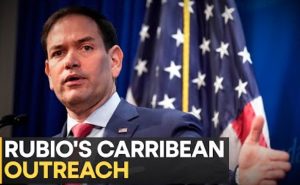
By Elias Ferrer Breda
A group of wildcat entrepreneurs visited Venezuela this week, aiming to revamp the country’s run-down oil sector, according to a source present in the meetings.
The U.S. investors met with representatives of Petroleos de Venezuela SA (PDVSA), the state-owned oil firm, as well as local private companies.
The delegation included Harry Sargeant III, the Florida-based oil businessman who has been a key figure in bringing together U.S. business interests and Venezuelan crude.
The group is introducing “investors with a high-risk appetite and world-class operators” into Venezuelan oilfields, said Sargeant in an interview.
Under the current government, the oil sector has been almost entirely controlled by PDVSA, though foreign investors are now obtaining more advantageous deals.
Since oil sanctions were eased in October, oil traders and executives from around the world have flocked to Venezuela, narrowing the steep discount for its crude. However, there are still many hurdles in the way of U.S. buyers, as most financial sanctions remain.
On January 12th, it was made public that Sargeant’s Global Oil Management signed a deal to buy six 95,000-barrel shipments of asphalt from PDVSA.
“We believe U.S. shale is in its seventh inning,” says Sargeant, “so we will need cheap oil from somewhere else.” Venezuela’s relative advantage is that much of the infrastructure is already built, even if in dire need of investment to recover production. It also boasts the world’s largest reserves: 303 billion barrels of oil, according to BP.
Venezuela’s particular crudes are also in high demand by Gulf Coast refiners, which were the traditional buyers. Western sanctions on Russia have put a strain on this sector, while Canadian heavy crude is being redirected westward to the Pacific.
Chevron CVX +0.3% is currently the only U.S. oil major operating in Venezuela. Others have tried to fill the vacuum left by North American capital. European firms have stepped in searching for oil and natural gas: Repsol, Eni, Maurel et Prom, and Shell. Indian, Russian, and Chinese interests are also working in the sector.
A new common understanding
President Hugo Chavez (1999-2013) had gone on a nationalization spree, implementing a hydrocarbons law that essentially reserved the sector for the state. After his death, President Nicolas Maduro at first continued his legacy.
However, something changed during the deep economic crisis of the last decade; from peak to trough around 80% of GDP was lost—in current U.S. dollars. Policies changed dramatically to deal with problems including U.S. economic sanctions, hyperinflation, scarcity, and violent crime.
Venezuela started welcoming foreign capital under different conditions. Already in 2018, we saw one of the first steps, as Sargeant struck a deal to recover fields in exchange for an almost 50% stake. The project was put on hold due to U.S. sanctions introduced in January 2019.
Natural gas is another example. Shell and Trinidad’s National Gas Company will operate an offshore field together off the eastern coast of Venezuela. Unusually, the state will not have direct control.
On the other side, U.S. oil businesses mostly favor the Republican Party, and therefore their interest in Venezuela could change the attitude of a future administration.
Under President Donald Trump, the White House pursued an aggressive regime change campaign, attempting to choke Venezuela until President Maduro was out.
The Biden administration has started to change the approach, arguing that it is negotiating with Caracas to produce free and fair elections in exchange for removing sanctions. This led to the release of prisoners, including ten U.S. citizens and multiple Venezuelan political figures.
The White House would also be concerned with the global supply of oil, given the war between Russia and Ukraine, and now instability in the Middle East. Conflict with the Houthis in the Red Sea has added another argument to this case.
Meanwhile, migration from the South American country has become a contentious issue in U.S. domestic politics. It is also a large burden for U.S. allies in the region, which host the largest populations of Venezuelans who have arrived in the last decade.
After the recent visit, it could be expected that both sides in Washington D.C. will favor some form of engagement with Venezuela. This changes the risk outlook for investors and oil traders; a Republican win in 2024 will not necessarily mean a return to conflict with President Maduro.
____________________________________________________
Elias Ferrer Breda is an energy contributor at @Forbes. Now focusing on Venezuela’s political process. Founder & editor @OvertheHedgeEM . @SOASDevelopment. Energiesnet.com does not necessarily share these views.
Editor’s Note: This article appeared on Forbes Magazine, in the January 19, 2024, All comments posted and published on EnergiesNet.com, do not reflect either for or against the opinion expressed in the comment as an endorsement of EnergiesNet.com or Petroleumworld.
Use Notice: This site contains copyrighted material the use of which has not always been specifically authorized by the copyright owner. We are making such material available in our efforts to advance understanding of issues of environmental and humanitarian significance. We believe this constitutes a ‘fair use’ of any such copyrighted material as provided for in section 107 of the US Copyright Law. In accordance with Title 17 U.S.C. Section 107. For more information go to: http://www.law.cornell.edu/uscode/17/107.shtml.
EnergiesNet 01 21 2024












